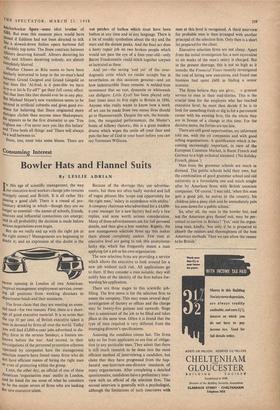suming Interest
Bowler Hats and Flannel Suits
By LESLIE ADRIAN IN tt our Strang JOininE 11M1110 longer tnteres and in Seriou his age of scientific management, the way executive-level workers change jobs remains ply casual and British. It is all rather like t a good club. There is a round of pre- ry drinking in which—though they are no so essential—the names of schools, friends, is and influential connections can emerge; all probability the decision is made before ; negotiations even begin.
But the rig doubt do we really end up with the right job at ht money? Managements are beginning to it; and an expression of this doubt is the recent Inspire log a depart The fiat ne age of the to now in You w
Play f knows ► nvesti operat selecti
not ha or eve I m Ameri and ht to be for ne opening in London of two American- .d management employment services, cover- II positions from working directors to ment heads and their assistants.
firms claim that they are meeting an essen- ed—for two reasons. First, there is a short- good executive material. It is so acute that p 10 per cent. of British executive talent is t demand by firms all over the world. Today ill find £3,000-a-year jobs advertised in dis- arm in the serious Sundays, a feature un- before the war. And second, in their gations of the personnel promotion schemes ed by companies here the management on experts have found many firms who do .ve efficient means of hiring the right man n of promoting within the group.
:t, the other day, an official of one of these can 'organisation man' outfits in London, listed for me some of what he considers the major errors of firms who are looking tv executive talent. Because of the shortage they use advertise- ments; but these are often badly worded and full of vague phrases like 'scope and opportunity for the right man,' salary in accordance with ability.' A company chairman who advertised for a £4,000- a-year manager for a new factcfry had only a few replies, and none worth serious consideration. Many of these advertisements ask for full personal details, and then give a box number. Rightly, the new management selection firms say this makes them almost completely useless. Few men at executive level are going to risk this anonymous lucky dip, which has frequently meant a man applying for a job in his own organisation.
The new selection firms are providing a service which allows the executive to look around for a new job without such risk. All applications go to them. If they consider a man suitable, they will notify him of the identity of the firm before for- warding his application.
There are three stages to this scientific job- filling. The first move is for the selection firm to assess the company. This may mean several days' investigation of factory or offices and the charge may be twenty-five guineas and upwards. Stage two is assessment of the job to be filled and takes place at the same time. Often it is found that the type of man required is very different from the managing director's specifications.
Assessing the candidate comes last. The firms take no fee from applicants so are free of obliga- tion to any particular man. They admit that there is still much research to be done into the most efficient method of interviewing a candidate, but claim that they have progressed from the hap- hazard one-interview-one-director standards of many organisations. After completing a detailed questionnaire, candidates have a preliminary inter- view with an official of the selection firm. The second interview is generally with a psychologist, although the limitations of such interviews with men at this level is recognised. A third interview for probable men is then arranged with another principal of the selection firm. Only then is a short list prepared for the client.
Executive selection firms are not cheap. Apart from the initial investigation fee, a sum equivalent to six weeks of the man's salary is charged. But in the present shortage, this is not so high as it sounds; the Financial Times recently investigated the cost of hiring new executives, and found one business had spent £608 in finding a senior scientist.
The firms believe they are givir !e greatest service to men in their mid-thirties. This is the crucial time for the employee who has reached executive level; he must then decide if he is to look for something fresh or dig in for a permanent career with his existing firm. On the whole they are in favour of a change at this time. For the decisive move, the forties are too late.
There are still good opportunities, my informant told me, with the oil companies and with good selling organisations. A qualification which is be- coming increasingly important, in view of the European Common Market, is fluent French and German to a high technical standard. (`No holiday French, please.') Men from the grammar schools are much in demand. The public schools hold their own, but the combination of good grammar school and old university is a formidable one and much sought after by American firms with British associate companies. 'Of course,' I was told, 'when this man gets a good job, he moves to the country, his children join a pony club and he immediately puts his sons down for a public school.'
So, after all, the man in the bowler hat, and not the American grey flannel suit, may be per- mitted to survive in Britain? 'Yes,' said the organ- ising man, kindly, 'but only if he is prepared to absorb the realism and thoroughness of the best American methods. Then we can allow the veneer to be British.'


































 Previous page
Previous page